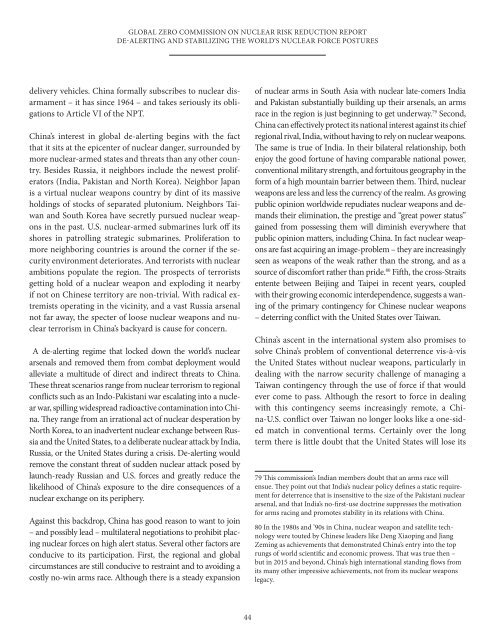global_zero_commission_on_nuclear_risk_reduction_report
global_zero_commission_on_nuclear_risk_reduction_report
global_zero_commission_on_nuclear_risk_reduction_report
Create successful ePaper yourself
Turn your PDF publications into a flip-book with our unique Google optimized e-Paper software.
GLOBAL ZERO COMMISSION ON NUCLEAR RISK REDUCTION REPORTDE-ALERTING AND STABILIZING THE WORLD’S NUCLEAR FORCE POSTURESdelivery vehicles. China formally subscribes to <strong>nuclear</strong> disarmament– it has since 1964 – and takes seriously its obligati<strong>on</strong>sto Article VI of the NPT.China’s interest in <str<strong>on</strong>g>global</str<strong>on</strong>g> de-alerting begins with the factthat it sits at the epicenter of <strong>nuclear</strong> danger, surrounded bymore <strong>nuclear</strong>-armed states and threats than any other country.Besides Russia, it neighbors include the newest proliferators(India, Pakistan and North Korea). Neighbor Japanis a virtual <strong>nuclear</strong> weap<strong>on</strong>s country by dint of its massiveholdings of stocks of separated plut<strong>on</strong>ium. Neighbors Taiwanand South Korea have secretly pursued <strong>nuclear</strong> weap<strong>on</strong>sin the past. U.S. <strong>nuclear</strong>-armed submarines lurk off itsshores in patrolling strategic submarines. Proliferati<strong>on</strong> tomore neighboring countries is around the corner if the securityenvir<strong>on</strong>ment deteriorates. And terrorists with <strong>nuclear</strong>ambiti<strong>on</strong>s populate the regi<strong>on</strong>. The prospects of terroristsgetting hold of a <strong>nuclear</strong> weap<strong>on</strong> and exploding it nearbyif not <strong>on</strong> Chinese territory are n<strong>on</strong>-trivial. With radical extremistsoperating in the vicinity, and a vast Russia arsenalnot far away, the specter of loose <strong>nuclear</strong> weap<strong>on</strong>s and <strong>nuclear</strong>terrorism in China’s backyard is cause for c<strong>on</strong>cern.A de-alerting regime that locked down the world’s <strong>nuclear</strong>arsenals and removed them from combat deployment wouldalleviate a multitude of direct and indirect threats to China.These threat scenarios range from <strong>nuclear</strong> terrorism to regi<strong>on</strong>alc<strong>on</strong>flicts such as an Indo-Pakistani war escalating into a <strong>nuclear</strong>war, spilling widespread radioactive c<strong>on</strong>taminati<strong>on</strong> into China.They range from an irrati<strong>on</strong>al act of <strong>nuclear</strong> desperati<strong>on</strong> byNorth Korea, to an inadvertent <strong>nuclear</strong> exchange between Russiaand the United States, to a deliberate <strong>nuclear</strong> attack by India,Russia, or the United States during a crisis. De-alerting wouldremove the c<strong>on</strong>stant threat of sudden <strong>nuclear</strong> attack posed bylaunch-ready Russian and U.S. forces and greatly reduce thelikelihood of China’s exposure to the dire c<strong>on</strong>sequences of a<strong>nuclear</strong> exchange <strong>on</strong> its periphery.Against this backdrop, China has good reas<strong>on</strong> to want to join– and possibly lead – multilateral negotiati<strong>on</strong>s to prohibit placing<strong>nuclear</strong> forces <strong>on</strong> high alert status. Several other factors arec<strong>on</strong>ducive to its participati<strong>on</strong>. First, the regi<strong>on</strong>al and <str<strong>on</strong>g>global</str<strong>on</strong>g>circumstances are still c<strong>on</strong>ducive to restraint and to avoiding acostly no-win arms race. Although there is a steady expansi<strong>on</strong>of <strong>nuclear</strong> arms in South Asia with <strong>nuclear</strong> late-comers Indiaand Pakistan substantially building up their arsenals, an armsrace in the regi<strong>on</strong> is just beginning to get underway. 79 Sec<strong>on</strong>d,China can effectively protect its nati<strong>on</strong>al interest against its chiefregi<strong>on</strong>al rival, India, without having to rely <strong>on</strong> <strong>nuclear</strong> weap<strong>on</strong>s.The same is true of India. In their bilateral relati<strong>on</strong>ship, bothenjoy the good fortune of having comparable nati<strong>on</strong>al power,c<strong>on</strong>venti<strong>on</strong>al military strength, and fortuitous geography in theform of a high mountain barrier between them. Third, <strong>nuclear</strong>weap<strong>on</strong>s are less and less the currency of the realm. As growingpublic opini<strong>on</strong> worldwide repudiates <strong>nuclear</strong> weap<strong>on</strong>s and demandstheir eliminati<strong>on</strong>, the prestige and “great power status”gained from possessing them will diminish everywhere thatpublic opini<strong>on</strong> matters, including China. In fact <strong>nuclear</strong> weap<strong>on</strong>sare fast acquiring an image-problem – they are increasinglyseen as weap<strong>on</strong>s of the weak rather than the str<strong>on</strong>g, and as asource of discomfort rather than pride. 80 Fifth, the cross-Straitsentente between Beijing and Taipei in recent years, coupledwith their growing ec<strong>on</strong>omic interdependence, suggests a waningof the primary c<strong>on</strong>tingency for Chinese <strong>nuclear</strong> weap<strong>on</strong>s– deterring c<strong>on</strong>flict with the United States over Taiwan.China’s ascent in the internati<strong>on</strong>al system also promises tosolve China’s problem of c<strong>on</strong>venti<strong>on</strong>al deterrence vis-à-visthe United States without <strong>nuclear</strong> weap<strong>on</strong>s, particularly indealing with the narrow security challenge of managing aTaiwan c<strong>on</strong>tingency through the use of force if that wouldever come to pass. Although the resort to force in dealingwith this c<strong>on</strong>tingency seems increasingly remote, a China-U.S.c<strong>on</strong>flict over Taiwan no l<strong>on</strong>ger looks like a <strong>on</strong>e-sidedmatch in c<strong>on</strong>venti<strong>on</strong>al terms. Certainly over the l<strong>on</strong>gterm there is little doubt that the United States will lose its79 This <str<strong>on</strong>g>commissi<strong>on</strong></str<strong>on</strong>g>’s Indian members doubt that an arms race willensue. They point out that India’s <strong>nuclear</strong> policy defines a static requirementfor deterrence that is insensitive to the size of the Pakistani <strong>nuclear</strong>arsenal, and that India’s no-first-use doctrine suppresses the motivati<strong>on</strong>for arms racing and promotes stability in its relati<strong>on</strong>s with China.80 In the 1980s and ’90s in China, <strong>nuclear</strong> weap<strong>on</strong> and satellite technologywere touted by Chinese leaders like Deng Xiaoping and JiangZeming as achievements that dem<strong>on</strong>strated China’s entry into the toprungs of world scientific and ec<strong>on</strong>omic prowess. That was true then –but in 2015 and bey<strong>on</strong>d, China’s high internati<strong>on</strong>al standing flows fromits many other impressive achievements, not from its <strong>nuclear</strong> weap<strong>on</strong>slegacy.44


